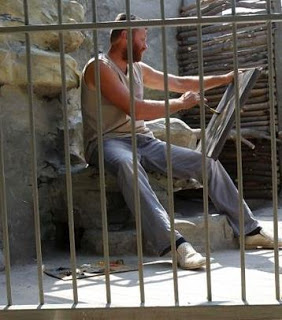I noticed at the adjoining exhibit a sign that stated, “Singers.” “That’s odd,” I thought. “There are tons of singers out there. Just turn on the radio, the TV, go into an elevator or a restaurant or supermarket. You hear it all the time and all around us. You almost can’t get away from it. There are billboards announcing the imminent arrival of popular singers, and the $300 seats all are sold out. Curious, I walked up to the display. This one contained a young boy along with a man and a woman.
“Are you all singers?” I asked. “Yes,” they replied. Puzzled, I then posed the question, “You can’t possibly be rare and endangered. Why are you here?” They smiled at me sadly, and the woman spoke up. “It’s all relative. There are so many people who claim to be singers, but really who are not, that those of us who truly are singers are in a small minority.” “What do you mean?” I asked. She explained, “The human voice can be used in many ways to make a sound, but to produce a sonorous, beautiful tone and a controlled technique is special. You must have a good voice to begin with; then it helps to have the voice trained properly. In the past, more people, from popular singers to opera professionals and boys choirs, used to sing well; but that art is being lost with most people these days. Now they scream, which is a different vocal mechanism. That’s not singing.”
I stopped to think about what she said and realized that it is true. It seems that, everywhere we go these days, we are held hostage to hearing screaming. At first, I thought that perhaps district managers chose recorded screaming because it could force restaurant-goers to give up their seats and leave more quickly. Then I remembered that a waiter told me that the restaurant chain was paid by the distributor of that noise with the hopes that the listeners would be so enthralled with it that they would rush out to buy or download that atavistic noise. It all came to money. Having been given food for thought, I slowly turned and continued on my way. As I left, I heard the man, woman, and boy begin singing in harmony some sublime melody. I felt a very pleasant sensation growing inside me.
The next exhibit had a sign that read, “English Teacher.” “Now how does that make sense?” I wondered. “Every school has an English teacher. How can they be rare?” I introduced myself and asked her. “Oh yes,” she replied. “There are a lot of people out there called ‘English Teachers,’ and some of them really try hard to do a good job. But, it’s difficult when the students and parents no longer read and often don’t really care about literature and well spoken language, when the English teachers take a back seat to the math and science teachers and even the football coaches. Also,“ she continued, “many of the people who go into teaching no longer have a solid base-core of knowledge, read very little, and cannot even speak well themselves. People may have heard of Shakespeare, but how many of them actually have read any? Listen to newscasters speak, to people with advanced degrees and those with professional positions of importance, even professors. Apparently, it never has occurred to them that having a good command of English is of any importance, for their constant errors in diction, grammar, and style are egregious.” Tears began to roll down her cheek. She quickly picked up a small, hardbound volume of poetry and began reading one of them aloud, trying to console herself. I left her in peace.
I began to notice that, as I walked through the zoo, my shadow had grown longer, and the sky was losing its intense blue. I looked at my watch, startled to find how much time I had spent with the first exhibits. Evening and closing time were approaching. So much more of the zoo’s endangered species remained for me to see. I looked at the zoo signs erected ahead of me along the path. The first one read, “Honest Businessman and Honest Contractor.” I saw that there were two people in that exhibit. The sign beyond that read, “Faithful Husband and Faithful Wife.” Two people were in that exhibit, also. There actually was a small group in the next exhibit marked “Good Fathers and Good Mothers.” I stopped to think about that. Perhaps the most difficult and important task in the whole world is raising children to be happy, healthy individuals who constructively contribute to society. And, whether the child is raised by a father and mother, two fathers or two mothers, or a single parent, that daunting task remains before them. With so many failed families, perhaps, after all, that small group was rare enough to be in the zoo.
As I strained to see farther down the zoo path, I saw what appeared to be an endless series of signs, far too many for me to explore in just one day. I never realized until then how much was endangered in our society. I promised myself that I would soon return to explore further; however, I better have a solid breakfast and get an early start. I knew then that there was far more to see and to think about at that unique zoo than I had anticipated.
© 29 July 2015
About the Author
I have had a life-long fascination with people and their life stories. I also realize that, although my own life has not brought me particular fame or fortune, I too have had some noteworthy experiences and, at times, unusual ones. Since I joined this Story Time group, I have derived pleasure and satisfaction participating in the group. I do put some thought and effort into my stories, and I hope that you find them interesting.

